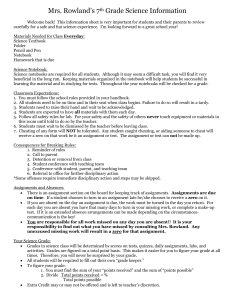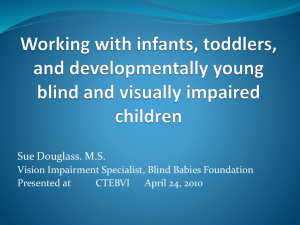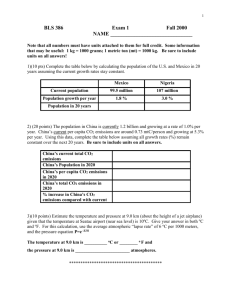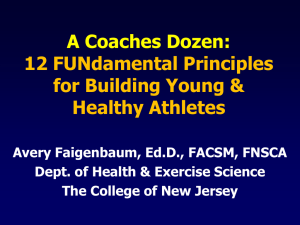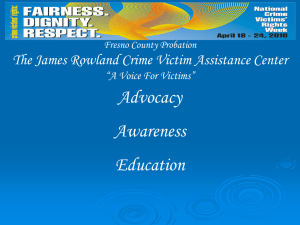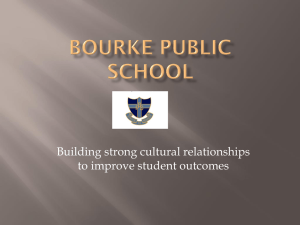Annual School Report 2013
advertisement
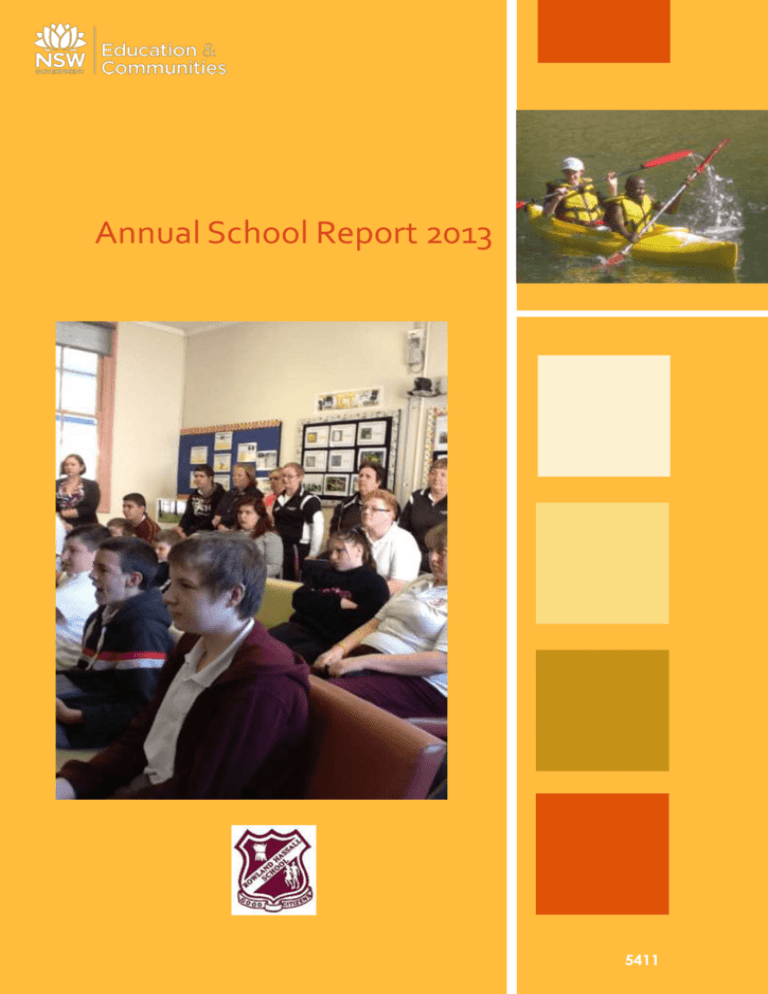
Annual School Report 2013 5411 Certificate 1 level and the development of a school café. School context Rowland Hassall School provides quality education opportunities for students who have been experiencing difficulties in their regular school. The school operates across two campuses at Parramatta and Telopea, for students from years 5 through to year 12. At the Parramatta campus there are currently 35 students enrolled in the school. The school provides individualised learning programs for students with a mild intellectual disability (IM) and an Emotional Disturbance or Behaviour Disorder (ED/BD). The Waratah Centre operates at Telopea where 21 students are enrolled. The centre provides educational programs for disengaged students with an Emotional Disturbance and/or Behaviour Disorders. Students are referred to Rowland Hassall and the parents/carers are offered a place for their child. There is a culture of mutual respect created by students and staff at the school. The Waratah Centre continued with their programs of engaging disaffected students with many reintegrating back to their home schools. There was a successful teacher exchange between the campuses using the expertise of staff to further enhance opportunities for our students. I would like to thank and congratulate our staff for the fantastic commitment they have shown to the education of all students at Rowland Hassall School. I would also like to give thanks to the parents and carers for the support they have given the staff, it has made a positive environment for our students. At the end of 2013, we said farewell to Mr Hardman, who has been a teacher of high standing at the school, and thanked Tony for his contribution to the education of the students he taught. I certify that the information in this report is the result of a rigorous school self-evaluation process and is a balanced and genuine account of the school’s achievements and areas for development. Principal’s message Rowland Hassall School continued to provide a quality education for all our students resulting in many highlights for their schooling and post school options. Jim Myers Principal The year saw us involved in many activities which extended our students in an atmosphere of fun and enjoyment. The highlight of these activities was our Outdoor Education Program which extended to an extensive garden project. All classes were involved in activities that provided real life authentic learning experiences including upgrading the gardens around the school and improving upon the kitchen garden. The environmental work on the Hawkesbury River continued with great results. Our P & C and/or School Council message Whilst there is no formal P&C, Parent Information sessions, including school planning for 2012-2014, Meet the Teacher afternoon, IEP review meetings, Education Week and NAIDOC events and various parenting forums on Cyber Safety, Centrelink, Respite care, TAFE opportunities and Post School Options, as well as an Ipad training session for parents were all very successful this year. In 2013, the school continued to work in collaboration with parents and our local community inviting new ideas and keeping everyone well informed of curriculum programs and initiatives. staff have been involved in Training and Development to improve the literacy and numeracy outcomes for our students. This included the utilisation of Literacy & Numeracy Continuums and embedding these into teaching programs, together with many excursions to support curriculum outcomes. We had a further development of timetables giving students more in depth exposure to KLA’s, experiencing different teachers and adjusting to changes to routines. The Student Representative council in 2013 was made up of students from each of the five classes at Rowland Hassall School. All students were proud, active members, taking on their role as communicators to the best of their abilities. All members brought their opinions and presented them clearly to the representative body. A new initiative was the setting up of a training room for Business Studies and Hospitality at During 2013, the SRC met each Monday in an open forum, where the members from each class presented ideas passed to them by their peers or 1 from their own observations of their school environment. These suggestions ranged from improvements to the school playground or equipment repairs, reward excursions for students to support the Positive Behaviours for Learning (PBL) principles in the school and organising fundraising days to support charities such as The Pyjama Foundation which supports children in foster care and National Bandanna Day, raising much needed funds for young people living with cancer. twice each term. Numbers vary throughout each year. Student attendance profile Records of attendance are kept through daily marking of rolls, which are checked regularly, calls home and text messages for unexplained absences of more than two consecutive days and letters sent to parents who have not provided reasons for absences of their child. Regular contact is made with the Home School Liaison Officer, regular tracking of attendance is made by executive staff and students are rewarded with certificates for good attendance at the end of each semester and at Presentation Day at the end of the year. Staff members are provided with updates and information regarding attendance procedures. The school has its own Attendance Policy and Procedures in line with DET guidelines. The success of the SRC would not have been possible without the support of the dedicated students and teachers at Rowland Hassall School. Student representative’s message 2013 has been the greatest year so far at Rowland Hassall School. All the students had a busy year, with students going to work experience, lots of excursions and trips to the river and community access. We also had a school camp and that was a great experience to all. Management of non-attendance The school implements a number of processes which help manage non-attendance. Students who are identified as having many absences are managed through these processes including parent/carer interviews, partial attendance programs and referral to the Home School Liaison service. This year we started targeting bullying. We also had a lot of fun with tech knowledge such as learning through the iPad, computers and smart TV and the new school camera. Post-school destinations Students leaving in Year 12 are supported in suitable post school options through collaborative planning with parents, teachers and the transition teacher. Our school though, as a school is more like a big family where we all get along together and have great teachers to guide us. In 2013, our Year 12 students were enrolled in Vocational TAFE courses in Hospitality at Blacktown and Granville campuses. We all said goodbye to our year 12 students who have taken a new path in their life. Good luck to them all for their future. All of our Year 12 students have been accepted in Transition to Work programs through Ability Options, Flintwood or Break Thru Post School Services. We hope that 2014 will also be a great year for all. By Jamie Smulders Student information To fully support students and their families with transition to work and post school options, Rowland Hassall School participated in a research study conducted by Dr. Iva Strnadová and Dr. Therese M. Cumming from the University of New South Wales. The research study, entitled Transitions of students with developmental disabilities: Fostering SchoolHome Partnerships, aimed to investigate parents’ It is a requirement that the reporting of information for all students be consistent with privacy and personal information policies. Student enrolment profile The student numbers at Rowland Hassall are determined by placements from the Western Sydney Regional Placement panel. This panel meets 2 and teachers’ experiences with school-home collaboration during schooling transitions for students with developmental disabilities. It specifically focused on the supports that need to be in place to allow for successful transition from the primary to secondary level, and from the secondary level to post-school life. engaged Aboriginal DEC personnel to consult with issues with our aboriginal students. Teacher qualifications All teaching staff meets the professional requirements for teaching in NSW public schools. Qualifications Degree or Diploma Postgraduate NSW Institute of Teachers Accreditation Interviews were conducted with teachers and parents and are currently being analysed. These data will be used to inform practices that support, facilitate and improve school-home collaborations during these crucial schooling transitions. Financial summary This summary covers funds for operating costs and does not involve expenditure areas such as permanent salaries, building and major maintenance. Dr. Iva Strnadová and Dr. Therese M. Cumming will prepare a report for Rowland Hassall School, summarising the research results and suggesting what improvements can be implemented at Rowland Hassall School in order to better support students and their families. Year 12 students attaining HSC or equivalent Vocational educational qualification In 2013, 100% of the year 12 students enrolled at Rowland Hassall School successfully attained their Life Skills Higher School Certificate. Workforce information It is a requirement that the reporting of information for all staff must be consistent with privacy and personal information policies. Date of financial summary 30/11/2013 Income Balance brought forward Global funds Tied funds School & community sources Interest Trust receipts Canteen Total income Expenditure Teaching & learning $ 177.694.50 139.854.40 85.014.67 21.487.63 6083.68 1.192.39 738.60 254.371.370 Key learning areas Excursions Extracurricular dissections Workforce composition Position Principal Deputy Principal(s) Assistant Principal(s) Head Teachers Classroom Teacher(s) Home School Liaison Officer Learning and Support Teacher(s) Teacher Librarian Teacher of ESL School Counsellor School Administrative & Support Staff Total % of staff 100% 75% 2 Library Training & development Tied funds Casual relief teachers Administration & office School-operated canteen Utilities Maintenance Trust accounts Capital programs Total expenditure Balance carried forward Number 1 0 2 1 8 2 1 0.2 0 1 9.8 26 8.745.60 1.461.06 11.788.48 6.334.99 49.44 104.495.33 18.801.95 28.294.33 669.97 33.635.15 27.837.31 2.404.99 0.00 244.518.60 187.547.27 Further details concerning the statement can be obtained by contacting the school. School performance 2013 The Australian Education Regulation 2013 requires schools to report on Aboriginal composition of their workforce. Currently there are no Aboriginal people working at Rowland Hassall School. We have During 2013, staff at Rowland Hassall School focused on improving Numeracy and Literacy skills. Initial assessment data was recorded using a variety 3 of assessment tools to set individual literacy and numeracy learning goals. New assessment policy has been developed and fully implemented which enabled teachers to track and record students’ progress regularly and adjust learning strategies accordingly to suit their individual needs. Teachers have been continuously integrating technology including iPads in their teaching programs. Furthermore, differentiating instructions and delivery methods were employed. Teachers embedded a variety of modern technology tools and creative media software to produce and present information in alignment with 21st century education standards. Progress in Numeracy Seventy five percent of the students in a sample class progressed from SENA 1 to SENA 2 during 2013. This trend was reflected across the school. Academic achievements Progress in Literacy Overall in 2013, Rowland Hassall School has improved both in literacy and numeracy because of the student-centered approach to learning including the use of digital education. Students achieved their goals supported by structured IEP’s and individual programming. The end of year assessment results have indicated that students have significantly improved reading skills (PM Benchmark, Literacy Continuum). All students increased their reading level; most students have increased their level in reading fluency and accuracy and developed better comprehension skills. Ninety percent of students who were targeted for our intensive reading program accelerated at least one level in the PM Benchmark assessment. Eighty percent accelerated two or more levels. 4 dealing with difficult or unfamiliar situations. Behavior expectations are further reinforced by role play during weekly assemblies and communicated to parents in school’s newsletter. PBL Benchmark Quality survey results have indicated that RHS is performing very well with overall score at 90% Higher School Certificate (HSC) In 2013, 100% of Year 12 students successfully completed the Life Skills Higher School Certificate. Record of School Achievement (RoSA) In 2013, 80% of the Year 10 students successfully completed the Record of School Achievement. Vocational Education Rowland Hassall School provided opportunities for all students who were of work experience age to participate in work experience programs. Because of the diverse needs of our students there were many programs run to suit the ability levels of each student. The programs included TVET and TAFE courses, independent work experience, group work experience, in school work experience and post school options. Our students completed successful placements in both supported settings and open employment at the following locations: Thorndale Industries Target Kmart No.1 Roofing & Building Taste of Tuscanny Restaurant Significant programs and initiatives Other achievements ESES The aim of the ESES program at Rowland Hassall School was to become a Centre of Excellence in the use of tablet technology. In addition to that, schools local to Rowland Hassall School in the Cumberland District have had access to staff and their expertise in providing quality teaching and learning programs using iPad technology to support disengaged students. Furthermore, in developing the project we have created a learning centre for the local community which will enable access to lessons on the use of 21st century technology in supporting essential technology skills for students at school and home. Many families of the school community do not have internet access at home and also very limited knowledge of the technology that is available at school for students. Eventually, accredited courses will be available for caregivers and the community including access to non- Positive Behaviour for Learning (PBL) During 2013, Rowland Hassall School continued to promote a strong Positive Behaviour for Learning approach to education. Students and teachers embraced the goal of our students becoming Safe, Respectful Learners and this has formed part of the Rowland Hassall School ethos over the past five years. The PBL principles have been embedded in a school based reward system incorporating “Hassle Free” slips that students can exchange for individually selected prizes. The system allows frequent feedback and positive reinforcement that is consistently linked with school wide expectations. The message that all students take from this is that being safe and respectful will assist you in becoming a diligent learner. Short, targeted skill streaming lessons are held daily as consistent reminders of expected behaviours and positive strategies when 5 ANZAC Schools Project government agencies to support their children as part of the services. In 2013, Rowland Hassall School received a grant for the construction of an Anzac Memorial Garden and the installation of an Anzac Talking Post that the community can access to give them directions to the H.M.A.S Parramatta. The school also entered in the Anzac Schools Competition to showcase the activities that Rowland Hassall School participated in for Anzac Day. A major part of this was a visit from a Vietnam veteran, an Anzac biscuit ‘Bake off’ and a visit from members of the Royal Australian Air Force. All students were actively engaged in these activities, particularly the Air Force visit, during which students were able to dress up in real military uniforms. Live Life Well In Term 1, 2013 Rowland Hassall School implemented Live Life Well across the school after creating an action plan for healthier living in 2012. The focus of the program was to encourage students to make positive food choices and engage in increased physical activity. Strategies that were used to improve eating habits included class fruit bowls and the implementation of a ‘traffic light’ system for community access visits. Games and activities were introduced during fitness time that focused on Fundamental Movement Skills (FMS). New sporting equipment was also purchased and changes made to the physical environment of the school including new court markings. Blue Grotto Throughout July and August, Rowland Hassall School engaged in a series of five film and sound recording workshops facilitated by Beyond the Square, Riverside Theatre’s creative arts program for people with disabilities. Students created a short video then exhibited it inside a purpose built inflatable Blue Grotto space, part of the free activity highlights at Riverside Theatre’s Spot On! Children’s Festival. Beyond the Square’s Creative Director, Alison Richardson said of the project, “The project aims to engage school aged students with disabilities in the creative process and give them the chance to work alongside professional video and sound artists to create their own short video & then have it publicly exhibited in a mainstream arts event.” Project Based Learning In Term 4, 2013, Rowland Hassall School started to implement the concept of Project Based Learning, with a focus to move towards this approach across the school in 2014. A group of five students was selected across age and ability groups to participate in a Project Based gardening unit of work that focused on preparing our kitchen garden for an interschool cooking contest. The unit had a strong focus on 21st century learning and targeted outcomes from multiple KLAs. Students were engaged and successfully created a thriving kitchen garden. 6 Crunch and Sip Duke of Edinburgh Award In Term 2, 2013, Rowland Hassall School introduced the Crunch and Sip program. In order to establish the program in the school and develop hospitality skills, the school provided fresh fruit and vegetables once a day which was prepared and served by students. This program has resulted in students making better food choices and including more fresh fruit and vegetables in their diet. Our school has had students involved in this program for the past two years. This year is very special because one student, Jamie Smulders achieved his Bronze Award. He is the first student with that accomplishment at Rowland Hassall School. The aim is to include all the students in the program. The students have to be involved on a regular basis in the following: fitness, recreational activities, skill acquisition, volunteering and for each Award an Adventurous Journey. Adidas Fun Run On 19 November 2013, Rowland Hassall School held an Adidas Fun Run to raise money for school activities and equipment. The event was a big success, raising a total of $337.75 which was used to purchase new sporting equipment. The students all participated in the run and were highly engaged. School Camp Staff took students to Patonga on the Central Coast for a camping experience. Students involved in the Duke of Edinburgh program have achieved the required entry for Adventurous Journey. Students were involved in different activities including fishing, setting up a camp site, swimming, canoeing and bush walking. All students enjoyed the experience and are looking forward to another camp in the future. Acquisition of Boat In Term 4 2013, Rowland Hassall acquired a boat for the purpose of supporting our environmental education program. The boat will continue to be utilised in 2014 for environmental activities and to support our PDHPE program. 7 Environmental Education on Hawkesbury River how to embrace multiculturalism in their own lives. Students also learned about key features of Indigenous history and how this relates to their own lives in the present day. In 2013, Rowland Hassall School continued to participate in environmental work on the Hawkesbury River as a part of the Clean 4 Shore project. This work is set to continue in 2014. School planning and evaluation 2012—2014 School evaluation processes NSW public schools conduct evaluations to support the effective implementation of the school plan. In 2013 our school carried out evaluations on effective teaching, student engagement and assessment. Effective Teaching Background The school sought the opinions of parents, students and teachers about the ways in which Rowland Hassall School teaches its students. A questionnaire was given to all stakeholders to address issues such as classroom management, programs, support for students, communication and record keeping. Findings and Conclusions 87% of respondents said that the way the teachers’ manage their classes helps the students to learn. 90% of respondents said that teachers at the school supported students in their learning Aboriginal education Staff generally indicated that they were effective in their teaching practice but had room for improvement. NAIDOC Our NAIDOC celebrations for 2013 included designing art work during visual arts studies and researching about the Stolen Generations during history elective. Students have continued to be involved in the planning and design of a Bush Tucker garden which was established through an authentic learning project in the grounds of Rowland Hassall School during 2012. Future directions Multicultural education In 2014, professional development will allow teachers to target particular areas for improvement and visit similar settings and workshops based on those areas. All staff will engage in professional learning that strengthens their use of the new National Curriculum and understanding of Project Based Learning. History elective Racism no way Student Engagement In Term 2, 2013 all students participated in a History elective titled ‘Racism No Way’. The focus of the unit was for students to learn about racial conflicts throughout history in different parts of the world. The key topics covered were Apartheid, The Civil Rights Movement and the Stolen Generations in Australia. As a result of this unit, students made links between historical events of prejudice and Background The school sought the opinions of parents, students and teachers about the ways in which Rowland Hassall School engages its students in teaching and learning activities. A questionnaire was given to all stakeholders to address issues such as programs, school initiatives and activities and support for students. 8 Findings and Conclusions To provide a wide ranging, inclusive curriculum. 88% of respondents indicated that they valued the programs and activities on offer at school Evidence of progress towards outcomes in 2013: Teachers have participated in a number of professional learning sessions to unpack the new English syllabus and have collaboratively developed a new scope and sequence in alignment with the Australian Curriculum content. A new Assessment Policy has been developed and implemented across the school. Teachers have collaboratively developed a new programming proforma, embedding a range of assessment and differentiation strategies. 94% of respondents indicated that the use of 21st century technology improves student engagement Most teachers, community stakeholders and students felt that the programs on offer at Rowland Hassall School help students to engage in learning and achieve their academic outcomes. Future directions In 2014 we want to continue to provide engaging opportunities for students to achieve their best and encourage parents to be involved in decision making for further improvements through regular information sessions and parent forums. Strategies to achieve these outcomes in 2014 Assessment Background The school sought the opinions of parents, students and teachers about the ways in which Rowland Hassall School assesses its students. A questionnaire was given to all stakeholders to address issues such as informal assessment, formal assessment and reporting. Teachers will develop their knowledge and understanding of the Mathematics Syllabus by participating in collaborative planning sessions with teachers form other schools (local learning community). Professional development for staff, release to visit similar settings for assessment, programing development and new curriculum implementation. Findings and Conclusions 71% of students indicated that they understood that teachers need to perform assessments in order to help them to learn. School priority 2 Leadership and Development 90% of staff felt that current assessment procedures assist them in setting individual learning goals. Outcomes from 2012–2014 Enhanced and developed leadership capacity in all staff including Principal, Assistant Principals, Teachers and School Learning Support Officers 65% of staff felt that they could improve their analysis of assessment data in order to set individual learning goals. Evidence of progress towards outcomes in 2013: Future directions In 2014, we plan to continue our policy of baseline assessment for current and newly enrolled students. Teachers will continue to improve their use of assessment data in addressing specific learning outcomes for students. School planning 2012—2014: progress in 2013 All staff have been involved in the Team Leadership for school Improvement program on a regular basis. Teachers have been provided with opportunities to work individually with a leadership coach. Teachers have each developed professional their learning plan by setting clear goals and areas for improvement according to our school priorities (linked to the school plan). Teachers have been encouraged and provided with opportunities to lead professional learning sessions. School priority 1 Curriculum and Assessment Outcomes from 2012–2014 9 Strategies to achieve these outcomes in 2014: level of student engagement across all stages. Teachers will be introduced to a new Performance and Development Policy including mentoring and coaching in professional goal setting and regular “check in” sessions with their supervisor. Students will be provided with more opportunities to develop their capacity for leadership by participation in the Duke of Edinburgh award scheme and peer mentoring. Teachers will continue to develop and enhance their ICT skills as well as their teaching practice by engaging in Triads, peer coaching and collaborative planning opportunities. Outcomes from 2012–2014 Improve overall students’ engagement Evidence of progress towards outcomes in 2013: In 2013, all student in year 11 and year 12 students were enrolled in Hospitality and Business studies course within the school. In 2013, all students were actively involved in a wide range of educational and wellbeing programs including: environmental education, Duke of Edinburgh, “You can do it”, Blue Grotto, “Rage” and sexual education for all age groups. Deliver Rock and Water Program to all age groups. Develop school café, run by students enrolled in Hospitality and Business courses. Parent/caregiver, student, and teacher satisfaction In 2013, the school hosted parent support sessions with active involvement of our social worker, school counsellor and Interrelate. The aim was to deliver a series of 'information sessions', providing parents and carers with behavior management strategies, followed by 'support sessions' where parents and carers could share their experiences of implementing the strategies. RHS participated in a research study entitled “Transitions of students with developmental disabilities”, conducted by Dr. Iva Strnadová and Dr. Therese M. Cumming from the University of New South Wales. "For us parents and grandparents we do make mistakes but we learnt we are allowed to be human and it's ok. I found out I wasn't alone. Be with other people and sharing that I felt we were all in the same boat and it was like a huge weight lifted off Strategies to achieve these outcomes in 2014: Throughout 2013, all staff members were involved in consistent professional learning opportunities. This included school development days, weekly staff training meetings, weekly collaboration meetings, stage meetings and special initiatives to support the school’s management plan and targets. Further ICT development sessions focused on the use of mobile technology and formed a major part of professional learning at Rowland Hassall for 2013. Another key aspect was active participation by all staff in the Team Leadership for School Improvement K – 12 Program. There have been a significant number of professional learning sessions dedicated to behaviour management strategies and our innovative Positive Psychology approach. Furthermore, we focused on programming and assessment including the implementation of all elements of assessment for learning strategies. In addition to this, Rowland Hassall School has also presented a series of professional learning opportunities on iPad technology and behaviour management for our local school community. Student Engagement and Attainment 85% of students have been involved in setting and tracking progress of their Individual learning and behavior goals on a daily basis Analyse research results and implement suggested strategies with a variety of resources to better support student in the process of transition to post school options. Professional learning School priority 3 Introduce Project Based Learning approach in teaching programs including the content and delivery methods to sustain the high 10 our shoulders and no one was blaming us- we were given ideas on how to get it right." By Glendah Lewis The sessions proved to be a great success and parents who participated have expressed that they have developed their parenting skills and valued the opportunity to share their personal experiences with other parents encountering difficulties with their children. About this report In preparing this report, the self-evaluation committee has gathered information from evaluations conducted during the year and analysed other information about the school's practices and student learning outcomes. The self-evaluation committee and school planning committee have determined targets for the school's future development. Mr Jim Myers – Principal Ms Ewa Brzozowska– Assistant Principal Mrs Amanda Scali – Relieving Assistant Principal Miss Kate Kennedy– Class Teacher Meagan Cook – School Counsellor Mrs Glendah Lewis – Parent School contact information Rowland Hassall School Cnr Hassall and Harris Streets PARRAMATTA NSW 2150 Ph: 9635 6363 Fax: 9687 1430 Email: rowlandhas-s.school@det.nsw.edu.au Web: www.rowlandhas-s.schools.nsw.edu.au School Code: 5411 11
